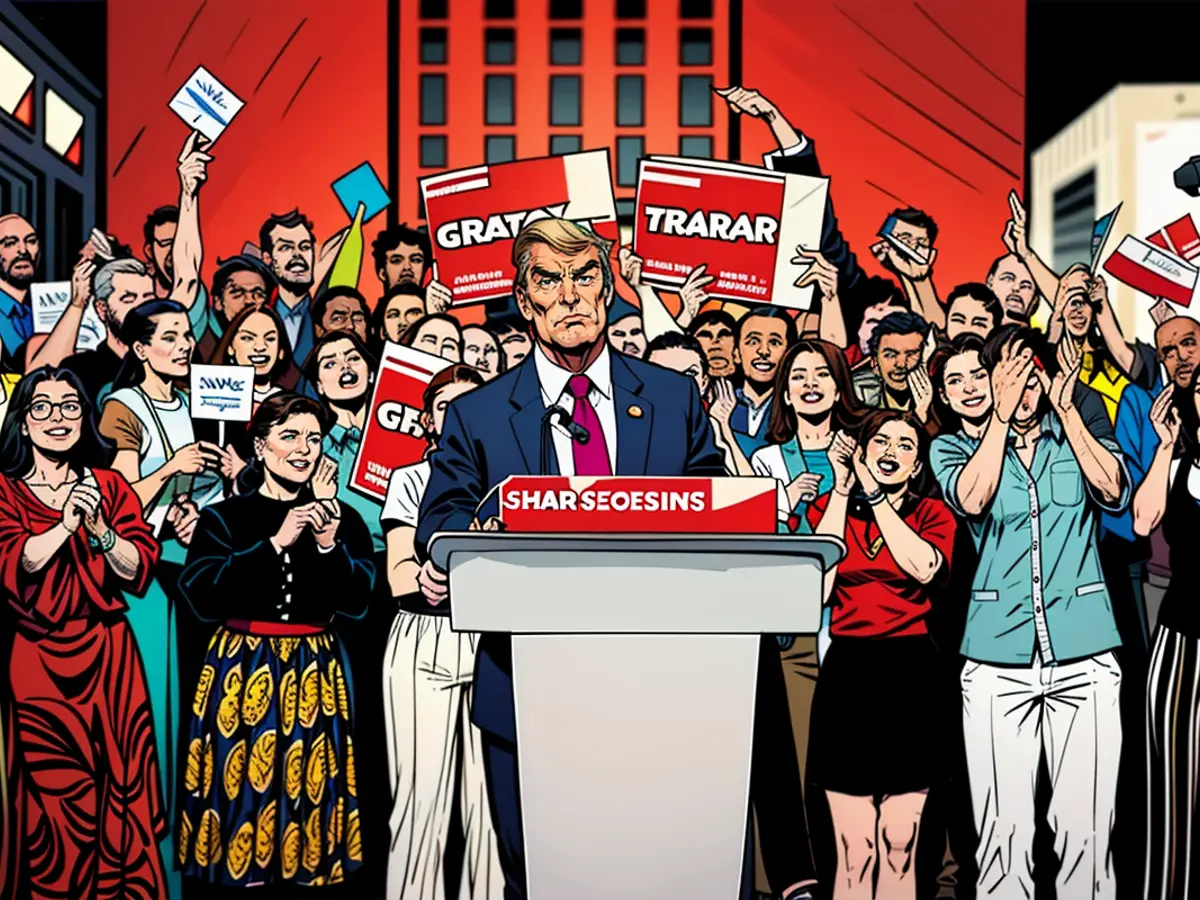Britain is avoiding direct involvement in the U.S. election, yet the intricacies of the 'Special Relationship' are becoming increasingly complex.
It's the strategy that Vice President Kamala Harris is aiming to employ, hoping it will lead her to the Oval Office. And it's proven successful before - in the UK, where Labour's Sir Keir Starmer managed to put an end to 14 years of Conservative rule in last July's election.**
The official stance from Starmer's administration is clear: London will maintain a constructive relationship with whoever emerges victorious in the U.S. presidential race.
However, some analysts can't ignore the resemblances between Starmer and Harris' backgrounds, ideologies, and paths to power. Moreover, several of Starmer's allies believe the strategy that propelled him to victory could also benefit Harris.
Claire Ainsley, Starmer's former director of policy, shared her insights with Democratic strategists and pollsters during this year's Democratic National Convention. Ainsley, currently leading the Project on Center-Left Renewal at the Progressive Policy Institute think tank, highlighted findings from Labour's electoral victory.
This exchange of information between both camps is not new and goes both ways, but it's been causing a stir in the final stages of the U.S. election campaign, with former President Donald Trump levying allegations of election interference against Labour.
Britain is bracing itself for potential strains with whoever wins the upcoming election, as disputes over trade, Ukraine, and NATO's future are top priorities for lawmakers. "The election outcome will have a significant impact on Britain, Britain's international policy, and various crucial issues for Britain's future," Ed Owen, a former advisor for the Home Office and Foreign Office, commented.
However, Trump's recent accusations against Labour have brought renewed attention to the complex and delicate state of the "Special Relationship" between Britain and the United States.
For decades, leaders in both countries have consciously avoided engaging in each other's politics. As political discourse becomes more heated in each nation, this unspoken agreement is becoming increasingly challenging to uphold.
'We're in a different world'
The Trump campaign's accusations against Labour shocked Westminster this week. Trump, who often leverages the threat of legal action for political gain, accused Labour of "deliberate foreign interference" in the election, citing trips taken by several party staff members to four battleground states. Labour maintains that these trips were made during their personal time and at their own expense, without violating any rules.
There's irony in the alleged interference claim; Trump's campaign has received support from significant figures on the British right, including populist figurehead Nigel Farage and former prime minister Liz Truss - whose endorsement goes against tradition.
"We live in a completely different world from the one we inhabited 30 years ago," Truss, who resigned as prime minister after just seven weeks and lost her parliamentary seat later in July, told CNN this week.
Truss claimed it was "overly presumptuous of the Labour Party to believe they have anything to offer the American people." But she emphasized that her visit to the Republican National Convention and her vocal support for Trump were not presumptuous; "Because the Labour Party is in the wrong, and they're causing nothing but harm to Britain."
There are multiple reasons Democrats might learn from Starmer. Both have leveraged their past as top prosecutors to take a tougher stance on crime and immigration than previous centre-left figures, targeting traditional working-class voters who feel excluded from their nations' evolving economies.
"Harris has faced a similar challenge, with her being an unknown entity," Josh Simons, a newly-elected Labour MP and the former director of influential think tank Labour Together, stated. "A significant part of her strategy revolves around assuring voters: ‘I am not a closeted radical.’ That was certainly true during our election campaign."
"You can see these lessons bouncing back and forth between the two countries," added Josh Freed, senior vice president for Climate at the Washington, DC-based Third Way think tank, who attended Labour's party conference last month.

Starmer and Harris both inherited parties in dire straits, with electoral success seeming distant. While Harris' ascension to the top of the Democratic ticket occurred mere months before the election, Starmer spent four years gradually restoring Labour's standing before the July poll.
"Labour didn't win the election this year; the Conservatives lost it," Truss, a Conservative MP, argued. "There's no doubt that the public wished to subject the Conservatives to a thrashing."
'Deep-rooted discomfort' in Westminster
Westminster acknowledges that a Labour government would prefer to work with a Democratic president; the parties share similar priorities, and polls consistently show Trump's unpopularity in Britain.
"Their aims align with ours," Mike Tapp, a Labour MP, said of Harris' campaign. "Being in harmony is beneficial, particularly in regards to NATO and diplomatic efforts in Israel. It's an assumption that would naturally apply to Kamala Harris."
Among Labour's lawmakers, the prospect of a Trump presidency evokes feelings ranging from "deep discomfort" to "a pragmatic acceptance of Trump's role in many developed democracies, as part of a trend towards populist, far-right, or in some cases neo-fascist political leadership," Simons said.
While President Joe Biden's political journey revolves around foreign policy, Harris' hasn't followed a similar trajectory. According to Simons, "Harris isn't at all pro-British or pro-Europe in the traditional sense. There's no strong inclination towards supporting the Old World. That sentiment isn't something we can rely on with Harris or those around her. It calls for a more direct approach where shared interests come into play."
The altercations could be more intense with a second Trump term. Trump's ambiguity regarding Ukraine's struggle against Russia is a significant worry for London. A decrease in US support for Kyiv could lead to a drastic split in foreign policies between Britain and the US.
The serious and sometimes grave Starmer is contrastingly different from Trump. This week's disagreement with Trump's campaign could add another layer of complexity to their already strained relationship.
However, some view the uncertainty of a potential second Trump term as an opportunity. Reflecting on his earlier presidency, Owen remarked, "During Trump's first term, it was a much more fluid situation. In essence, everything was up for grabs. It allowed for greater influence on American policy."
An unpredictable foreign policy could present challenges for American diplomats, but it also opens up possibilities for allies. "We've got the ability to manage Trump's unpredictability," Tapp stated. "We can collaborate with him."
Britain has tools in its longstanding repertoire that could potentially appease a former president who still holds Britain in high esteem and has fond memories of the late Queen Elizabeth II. "The UK has some compelling offers that resonate with Trump," Freed added. "Meeting with the King is a powerful tool for the UK. The grandeur and pageantry is similar."
However, a second Trump term would be a turning point for the West. Many in Britain still recall the events of January 6, 2021, with distress. "What transpired on that day was quite devastating for the world," Tapp said.
While Germany's Scholz and Australia's Albanese are grappling with tough reelection races, France's Macron saw his power diminish in July. Should Harris fail in her bid, Starmer could be the last centrist left in the room.
"The question for Starmer is: What does a Trump-led America look like, and what responsibilities does the UK have to lead global centrism and global democracy?" Freed asked. "Given the lack of stable democracies led by center-left parties, it might fall on Starmer and the Labour Party whether they wish it or not."

The allegations of election interference from Trump towards Labour have brought the "Special Relationship" between Britain and the United States into the spotlight, highlighting the complexities and challenges in avoiding each other's politics.
Despite the unspoken agreement to avoid engaging in each other's politics, analysts have noticed similarities between the strategies that led to Starmer's victory in the UK and Harris' ascension in the Democratic party in the US.








